This article was co-authored by Trudi Griffin, LPC, MS. Trudi Griffin is a Licensed Professional Counselor in Wisconsin specializing in Addictions and Mental Health. She provides therapy to people who struggle with addictions, mental health, and trauma in community health settings and private practice. She received her MS in Clinical Mental Health Counseling from Marquette University in 2011.
There are 8 references cited in this article, which can be found at the bottom of the page.
This article has been viewed 30,314 times.
Depression is a common medical condition, but many people find it difficult to discuss the problem or admit they have an issue with it. Know how to talk to a doctor about depression so the two of you can communicate effectively and so that you can get the help you need.
Steps
Doing Your Homework
-
1Develop an understanding of depression beforehand. Decide if you are experiencing the symptoms of depression so that you can know exactly what to tell your physician. Be informed by reading up on symptoms of depression before your appointment. Doing some research will make you more familiar with the condition and make it easier for you to talk to your doctor. Symptoms of depression include:[1]
- Little hope for the future
- Feeling worthless or guilty
- Being easily agitated
- Loss of interest in normally pleasurable activities
- Withdrawal from friends or loved ones
- Sleep changes (e.g. sleeping too much or too little)
- Appetite changes (e.g. eating more or less)
- Losing or gaining weight
- Using alcohol, drugs, gambling or other vices to distract or self-medicate
- Experiencing physical ailments
-
2Talk with family members to see if it is common in your family. It may be helpful to consider your family history when thinking about your risk for depression. In some cases, depression can be both genetic and environmental, running through multiple generations of a family.[2]
- Speak to your parents or siblings to see if they have ever battled depression or know another relative who has. This information could help your doctor determine the source of your symptoms, which will help him treat you more effectively.
Advertisement -
3Think about any recent changes or stresses you have experienced. Since depression forms from a combination of psychological, biological, and social factors, your illness could have manifested after a recent stressor. It may be hard to see a connection, but certain circumstances that you endure in life can contribute to depressive symptoms.[3] Stressors or life events that may cause depression are:[4]
- Trauma or abuse in early childhood
- Marital or relationship discord
- Financial strain
- Unemployment or underemployment
- Lack of social support
- Loneliness
- Alcohol or substance abuse
- Chronic pain or medical conditions
-
4Make a list. If you've noticed recurring periods of depression, make a list of the times you feel depressed, what emotions you feel and what's going on in your life that you think might be contributing to the problem. Having a history of your symptoms will make it easier to talk to your doctor about depression and help your physician determine the best treatment for you.
- You can even download a worksheet that allows you to be aware of potential questions your doctor may ask and be prepared with your answers. You can bring this worksheet along with you to your appointment to be sure you cover all the bases. Do an online search.
Making an Appointment
-
1Figure out if you want to involve someone else first. Some people need a support system before taking the next step and actually seeing a doctor for depression. Before you choose to see the doctor you may want to consider if you want to involve someone else to come with you or be supporting you and rooting for you to get well.
- If you are a religious person, you may want to talk to your pastor or clergyman to gain the strength to get help.
- If you have a close family member or friend who has dealt with depression, you might get support by asking him to attend the appointment with you. You may be comforted by the presence of someone who has experienced something similar to what you are going through.
-
2Think about the rapport you have with your doctors. Before you make an appointment, consider how you might bring up the subject of your depression and how you will feel. If the thought scares you, and you don't have someone to go with you for support, you might think about choosing a different doctor to talk to about your depression. Understand that your primary care doctor isn't the only choice.
- Some people may have more regular visits or feel more comfortable with other doctors, such as a gynecologist/obstetrician or a cardiologist. You can always talk to this physician about your symptoms and then she can refer you to a mental health specialist.
- In an emergency situation, an ER doctor or hospital mental health professional can provide support and give you information on where to seek help when you leave the hospital.
- Other professionals or places where you may be able to find help include clinical social workers, a counselor at a community mental health center, University- or medical school-affiliated programs, state hospital outpatient clinics, family service/social agencies, private clinics and facilities, employee assistance programs, or local medical and/or psychiatric societies.[5]
-
3Manage your expectations. After you choose which doctor you want to talk with about your depression, think about your goals for the visit. What would you most like to accomplish from seeing your doctor?
- Be sure that your expectations are reasonable. Choose one or two small, realistic goals for the visit. For example, going with the goal to get a diagnosis and stop the symptoms is huge and unlikely to be reached in a week. However, going with the objective to let your doctor know about your symptoms and learn more about depression is realistic and likely to be met.
Going to the Appointment
-
1Don't minimize the issue. Be honest about the intensity of your symptoms. Your doctor is there to help you deal with your depression, so be honest about your feelings and symptoms. It might seem scary or embarrassing, but being honest and talking openly is the best way to help your physician help you.
- Avoid saying things like "Oh, it's not so bad" that makes the issue sound smaller than what it is.
-
2State the issue plainly. Beyond honesty, you also need to be direct about your symptoms. Refrain from speaking about the issue ambiguously. Your doctor can easily believe any problems you are experiencing are a result of a medical condition rather than a mental illness. Being as clear as possible prevents confusion.
- To be direct, you might say, "Dr. Barden, I think I have been feeling depressed lately" or "I have been feeling totally hopeless about my life. I haven't been eating or sleeping, and I have missed several days of classes over the last few weeks."
-
3Discuss medication changes. Mention any changes in your daily medication regimen when you discuss depression with your doctor. Adding or removing medications from your daily regimen could be increasing symptoms of depression, as certain medications used to treat medical conditions cause side effects such as sadness or despair.[6] For this reason, you should make your doctor aware of all prescription and over-the-counter drugs you take.
- Medications which may cause depression include Accutane, anticonvulsants, beta-blockers, statins, Zovirax, benzodiazepines, Norplant, and more.[7]
-
4Talk about your options. Prescription medications are a common remedy for treating symptoms of depression, but they're not the only option. You might be able to explore personal exercises like journaling, or even holistic treatments, such as meditation or acupuncture, to help with your depression.[8] Be sure to discuss all your options with your doctor to get his opinion about their effectiveness so you can make the decision that best fits your lifestyle.
-
5Ask for a referral. Your family doctor has the authority to prescribe you antidepressants, but generally, these doctors are not specially trained in treating mental disorders. Firstly, you need to be absolutely sure what you are experiencing is depression in order to appropriately treat it. Then, you can decide with an experienced mental health professional which treatment strategy is right for you.[9]
- What's more, mental health professionals like psychiatrists have a better understanding of medications proven to alleviate depression, and a therapist or psychologist may be required for therapy.
-
6Take responsibility for following up. You have taken the first step necessary in recovering from your depression. Now, it is important for you to follow up. If your primary care doctor prescribed you meds, you must attend a follow-up visit to discuss if and how they have been working. If you are being referred, you must schedule additional appointments with other providers.
- You have shown great courage by speaking to your doctor about depression. Continue to take ownership of your mental health by getting the care that you need.
References
- ↑ http://www.helpguide.org/articles/depression/depression-signs-and-symptoms.htm
- ↑ http://www.webmd.com/depression/features/depression-when-its-all-in-the-family
- ↑ http://www.webmd.com/depression/features/stress-depression
- ↑ http://www.helpguide.org/articles/depression/depression-signs-and-symptoms.htm
- ↑ http://psychcentral.com/lib/where-to-get-help-for-depression/
- ↑ http://www.webmd.com/depression/guide/medicines-cause-depression
- ↑ http://www.webmd.com/depression/guide/medicines-cause-depression?page=2
- ↑ http://www.helpguide.org/articles/depression/depression-treatment.htm
- ↑ http://www.webmd.com/depression/finding-doctor-therapist
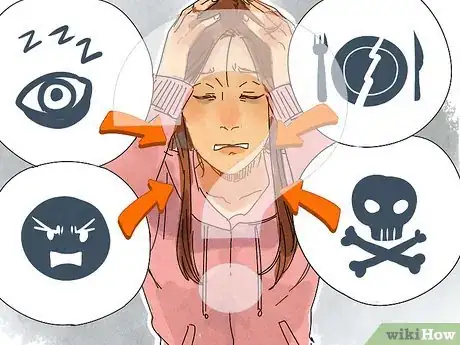
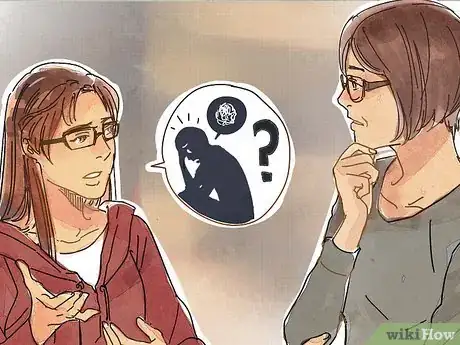
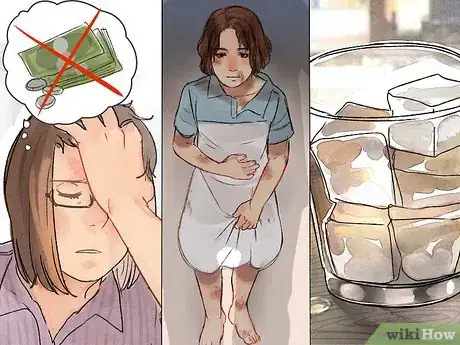
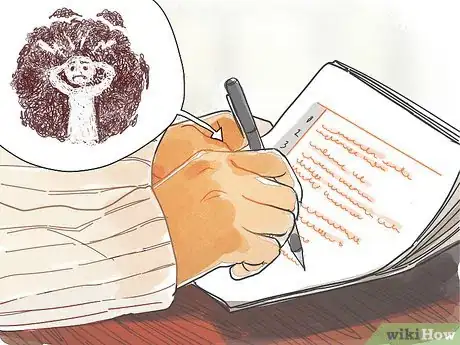



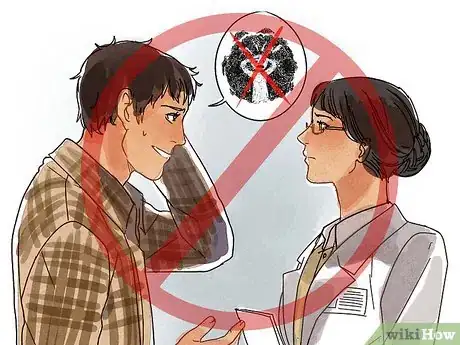
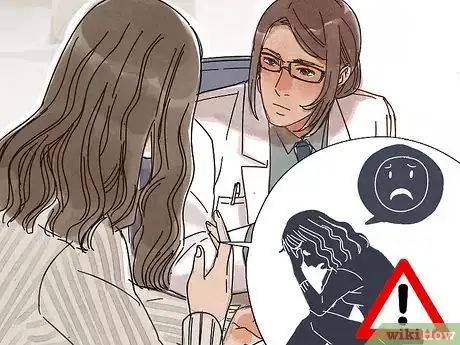


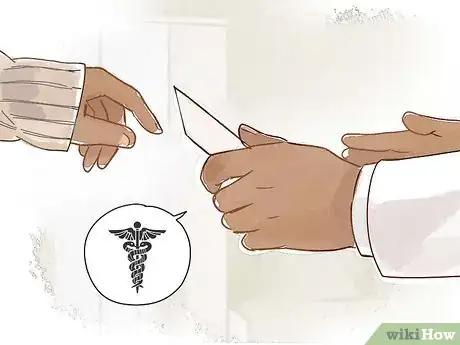
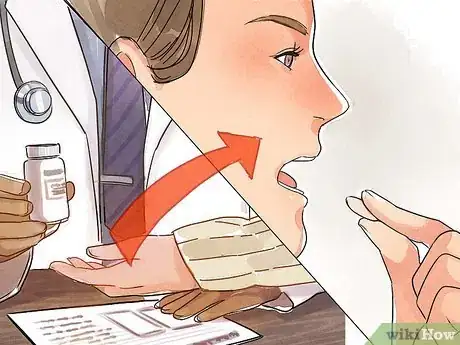



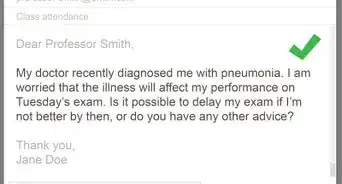
-Step-14-Version-2.webp)
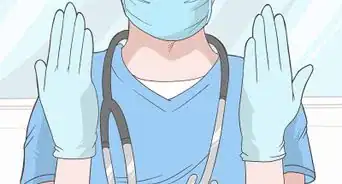






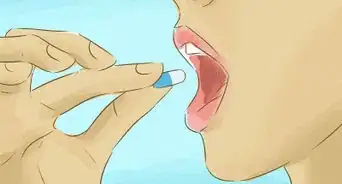











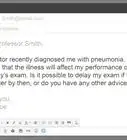




































Medical Disclaimer
The content of this article is not intended to be a substitute for professional medical advice, examination, diagnosis, or treatment. You should always contact your doctor or other qualified healthcare professional before starting, changing, or stopping any kind of health treatment.
Read More...